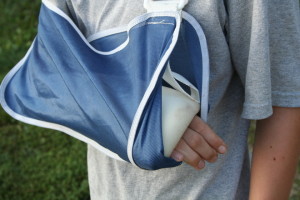Charlotte Personal Injury Attorney Matthew R. Arnold of Arnold & Smith, PLLC answers the question “What can you sue for in a personal injury case?”
Anyone who has had a loved one seriously injured in a North Carolina personal injury accident understands that the victim is not the only person impacted. Instead, accidents have a ripple effect, impacting family members and loved ones who must cope with the emotional injuries associated with serious accidents. There’s a term for this harm: loss of consortium. To learn more about loss of consortium and how it works in the context of a North Carolina personal injury case, keep reading.
Loss of consortium is a cause of action for damages suffered by certain family members of a person injured or killed by the negligent or intentional wrongful acts of another. The simple version of this is that when someone hurts someone else, the loved ones of the victim are able, in certain cases, to bring a claim for damage against the responsible party.
When are loss of consortium cases filed?
Loss of consortium cases are most commonly seen when a spouse has been injured. For example, if a husband was injured in a terrible automobile accident, his wife might file a claim for loss of consortium. The wife would claim that her husband is no longer able to do chores and help with the household like he once could, or that the loss of companionship and affection has caused harm that deserves compensation. These cases are not limited only to spouses. Parents are able to file claims for loss of filial consortium, which are meant to compensate the parent for the loss of love and companionship that results from a child’s serious injury or death. Similarly, some states allow for loss of parental consortium claims.
What damages are included in loss of consortium claims?
Previous court rulings in North Carolina have made clear that loss of consortium claims exist to compensate loved ones for the absence of the family member’s service, society, companionship, sexual gratification and affection.
How do you value a loss of consortium claim?
Valuing a loss of consortium claim can be difficult and is more an art than an exact science. There is no formula for loss of consortium claims, and really, how could there be? The whole point is that these claims are intended to compensate someone for the deeply personal pain they now feel due to harm suffered by a loved one. This is by necessity personal and situation-specific. Judges and juries will base a decision on testimony from family members and friends, trying to understand what the victim’s life was like before the injury and what life is like after. The hope is that a jury gets a sense of how much a person contributed to their marriage and to the household, helping them better value the harm suffered. In the end, awards vary just as juries vary.
How are loss of consortium claims filed?
Loss of consortium claims do not exist as separate claims, so the spouse or parent would not need to file a loss of consortium lawsuit. Instead, loss of consortium claims are joined to the injured victim’s original personal injury lawsuit.
How long do you have to file a loss of consortium claim?
The statute of limitations for loss of consortium claims depends on the type of injury that lead to the harm. For instance, the statute of limitations for North Carolina personal injury claims is three years from the date of the injury, while product liability claims are six years from the date the product that caused the harm was purchased.
If you or someone you know has any questions regarding potential personal injury claims, feel free to contact the experienced personal injury attorneys at Arnold & Smith, PLLC in Charlotte, North Carolina for a free consultation. Call toll free at (955) 370-2828 or click here for additional resources.
About the Author
Mr. Arnold was raised in Charlotte, where he graduated from Providence Senior High School. He attended Belmont Abbey College, where he graduated cum laude, before attending law school at the University of North Carolina at Chapel Hill on a full academic scholarship.
A board-certified specialist in the practice of Family Law, Mr. Arnold is admitted to practice in all state courts in North Carolina, in the United States Federal Court for the Western District of North Carolina, in the North Carolina Court of Appeals and Supreme Court, and in the Fourth Circuit United States Court of Appeals in Richmond, Virginia.
In his free time, Mr. Arnold enjoys golfing and spending time with his wife and three children.
Image Credit:
http://www.freeimages.com/photo/broken-arm-1435980
See Our Related Video from our YouTube channel:
https://www.youtube.com/user/ArnoldSmithPLLC/videos
See Our Related Blog Posts:


